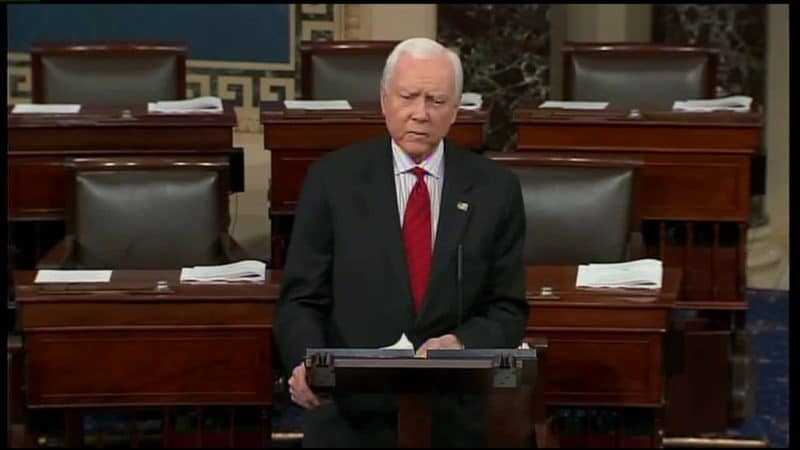Time for Republicans to Make Their Peace With LGBTQ Rights
COMMENTARY

Perhaps it was all those holiday wishes for “Peace on earth” and “Goodwill to mankind” that crept into the mind of retiring Sen. Orrin Hatch.
In his farewell address to Congress this week, the Utah Republican floated an idea at odds with a large part of his party’s base, among whom Evangelical Christians are disproportionately represented.
Hatch, a Mormon, said religious conservatives could make peace with affirming the equal rights of LGBTQ Americans.
“Pluralism shows us a better way,” he said, according to the Washington Post. “It shows us that protecting religious liberty and preserving the rights of LGBTQ individuals are not mutually exclusive.”
Unfortunately, Hatch’s call for common ground, for reasonable people to meet, does not seem likely — not in this White House. The president has given lip service to the LGBTQ community and yet let his administration stomp on gains that some secured.
Recall that the White House stirred up unnecessary controversy by rescinding guidelines that had been allowing public schools to let students use whichever bathroom they wished, based on their gender identity.
Previously, many public (and private) school districts had quietly managed the needs of transgender students, often by making a separate unisex bathroom available.
The day after Hatch made his plea, the Trump administration asked the U.S. Supreme Court to allow at least a temporary ban of transgender people in the military, even as the lower courts are still debating the issue. That effort dismisses the fact that former and present commanders and national security experts consider the people crucial to military.
In October, it was reported that the Trump administration was trying to circumvent the courts by changing the definition of sex in federal civil rights standards to be “a person’s status as male or female based on immutable biological traits identifiable by or before birth.”
Policy gambits like these, surely aimed at scoring points with conservative Christian voters, are utter failures in light of the “rainbow wave” evident in the results of November’s elections. More than 240 of the 432 openly LGBTQ candidates who sought office were elected, according to The Victory Fund, the political action committee of The Victory Institute, which advised and supported many of those candidates.
The outcomes suggest that Americans are far less concerned with sexual orientation or identity than conservatives believe they are.
More than 150 self-identified openly LGBTQ politicians had signed a letter at the time Hatch spoke, detailing what they expect from the 116th Congress that will take office in January. A key demand is the passage of the Equality Act. The bill would extend civil rights protections that are commonly understood for race and national origin to LGBTQ people as well. It would ban discrimination in employment, housing, credit, education, public spaces and services and all federally funded programs.
The law would not prevent you from barring a gay person from your own home. Nor would it prevent you from denouncing such people as an abomination to God or to preach it in your church.
However, it would make it illegal to deny someone a job because you think they are gay, or to deny them a bank loan, or to bar them from buying a house, from studying in a public school or from doing something as benign as walking in a public space.
Such federal protections do not exist for LGBTQ people.
Hatch articulated a point that is often misunderstood, especially by conservatives. Ensuring equal rights to all is not giving “special rights” to some. Nor does it infringe on the conscience of a religious believer. It simply means that a religious person may not use his religious views as an excuse to restrict the rights of another.
Trump is probably as personally invested in this question as he is in any other article of faith — that is, not at all. However, Vice President Mike Pence is a true believer. The bible is the relevant source of authority. As the quip of conservative Christians has it, “God created Adam and Eve, not Adam and Steve.”
Beneath this point of view is a wishful ignorance: the false belief that people choose their sexual orientation. To admit that this is not the case is, perhaps, too dangerous for many religious conservatives. It opens the door to other doubts about doctrine and faith.
Hatch, in his parting words to Congress, did not appear concerned about that. Rather, his heartfelt appeal seemed more aligned with these words from Jesus: “Render to Caesar the things that are Caesar’s; and to God the things that are God’s.”
America’s political ethos, at its best, encourages us to see the other person as equally deserving of the civil rights we ourselves enjoy. And the fate of citizens in the world to come is none of our government’s business.
—
Readers can reach Mary Sanchez at [email protected] and follow her on Twitter @msanchezcolumn.
—
© 2018, MARY SANCHEZ DISTRIBUTED BY TRIBUNE CONTENT AGENCY, LLC






















